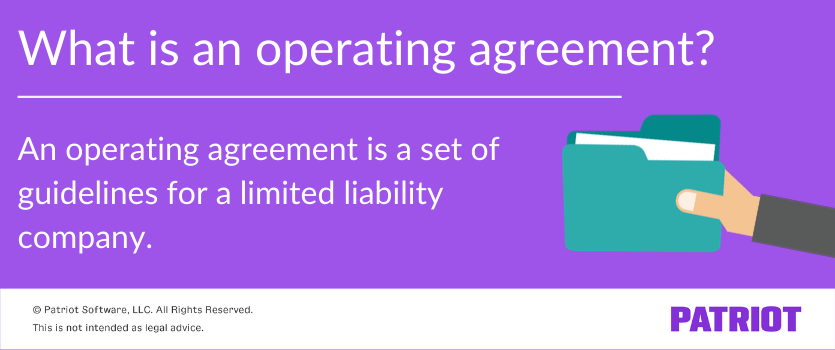When you start a business, you’re in charge of juggling multiple tasks simultaneously. And if you establish a limited liability company (LLC), you may need to create a business operating agreement for your company. To familiarize yourself with all things operating agreements, keep reading.
Business operating agreement
So, what is an operating agreement? Glad you asked. An operating agreement is a set of guidelines for a limited liability company. An LLC is a type of business structure that mixes components of a corporation (limited liability) and partnership (pass-through taxation). LLCs can have one or more members.
Operating agreements work similarly to bylaws for corporations. Your LLC agreement covers things like your business’s name and purpose, members’ and managers’ names, how to elect new members, and more.
Regardless of if you have a single-member LLC or multiple-member LLC, you should consider having an operating agreement to keep things in order.
If there are multiple members in your LLC, the company operating agreement becomes a binding contract for the members.

Importance of having an operating agreement
Not all states require an LLC to have an operating agreement. And sometimes, operating agreements are only required if the LLC has more than one member.
Even if you’re not required to have one by law, an operating agreement can still benefit your LLC. A limited liability company operating agreement:
- Gives you more control over your business
- Protects the LLC
- Makes details and procedures of the LLC clear
- Brings formality to your company
- Helps resolve misunderstandings and conflicts
Are you required to have an operating agreement?
A few states require LLCs to create an operating agreement and keep it in their records.
The following states require an LLC to have some form of an operating agreement:
- California
- Delaware
- Maine
- Missouri
- New York
No state requires an LLC to file its operating agreement with the state.
The requirements for the operating agreement vary by state. Some states require the operating agreement to be in writing. And, some states expect LLCs to establish their operating agreement immediately.
Check with your state to find out its requirements for operating agreements to ensure you stay compliant.
What to include in an LLC operating agreement
When it comes to a limited liability company operating agreement, there are a few sections you should include. Although operating agreements vary depending on the LLC, most include the following sections:
- Introduction information
- Members and contributions
- Management
- Capital contributions
- Distributions
- Meetings and voting
- Dissolution
Keep in mind that the above list is not all-inclusive. Your LLC may need additional or fewer sections depending on how many members you have and your business rules.
Introduction information
This section goes over basic information about the LLC, such as the:
- Business name
- Business address
- Purpose of the LLC
- Information about the LLC’s articles of organization
Members and contributions
This section of the operating agreement focuses on how members join the LLC and what they contribute. It should include things like the members’ names, the process of electing or adding new members and removing members, and the amount each member contributes.
Management
The management section of your operating agreement details how your LLC plans on electing managers and who the current managers are (if applicable). This section also goes over how long managers can serve and any limitations they have.
Capital contributions
In this section, you will cover which members have given funds to start up the LLC. You must include the value of said funds and their form (e.g., cash, property, services, etc.) It also goes over how you plan on raising additional funds.
Distributions
Each member typically shares in the profits and losses based on their percentage of interest in the LLC. This section includes how the business’s profits and losses are shared with members (e.g., assets and money).
Meetings and voting
In this section, state information about when and where member meetings will be held as well as when, how, and where voting takes place. You should also include which members can vote and other rules pertaining to voting.
Dissolution
This section covers conditions and procedures for dissolving the LLC (if or when the time comes).
Searching for an easy way to manage your business’s books? Patriot’s accounting software lets you streamline the way you record income and expenses. Try it for free today!
This is not intended as legal advice; for more information, please click here.



